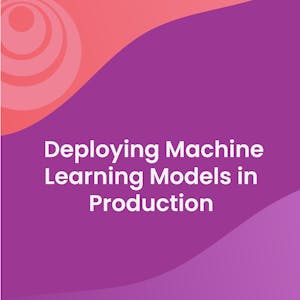In the fourth course of the Machine Learning Engineering for Production Specialization, you will gain the expertise needed to deploy machine learning models in production environments. This comprehensive training will cover various aspects of deploying ML models, including scalable infrastructure, workflow automation, model monitoring, and delivery. The course will also focus on ensuring the continuous operation of production systems by detecting and addressing model decay and performance drops.
Upon completing this course, you will possess the essential skills to deploy ML models and make them available to end-users in real-time and batch scenarios. You will also be proficient in implementing workflow automation and progressive delivery in accordance with current MLOps practices to maintain a robust production system. This specialization combines machine learning concepts with modern software development and engineering roles, providing you with the necessary production engineering capabilities to build a successful AI career.
Certificate Available ✔
Get Started / More Info
This course comprises four modules that cover model serving introduction, serving patterns and infrastructures, model management and delivery, and model monitoring and logging.
This module provides an introduction to model serving, including deploying models to AI prediction platforms and installing TensorFlow Serving. You will also gain hands-on experience with labs covering best practices, Docker, and TensorFlow Serving.
In this module, you will delve into model serving patterns and infrastructures, exploring topics such as scaling infrastructure, online and batch inference, and data preprocessing. Hands-on labs will cover deploying ML models with FastAPI and Docker, Kubernetes, and latency testing.
Module 3 focuses on model management and delivery, covering experiment tracking, MLOps methodology, model management, continuous delivery, and progressive delivery. You will also work on labs related to Kubeflow pipelines, model versioning, and CI/CD pipelines with GitHub Actions.
The final module delves into model monitoring and logging, addressing the importance of monitoring in ML, model decay detection and mitigation, responsible AI, legal requirements, and GDPR and CCPA. It also includes optional references and an opportunity to mentor other learners.
Probabilistic Graphical Models offers a comprehensive study of encoding probability distributions, inference, and learning in complex domains, making it a foundational...
Launching into Machine Learning en Français offers a comprehensive exploration of data quality improvement, exploratory analysis, AutoML models with Vertex AI and...
Learn to build and train regression models using Scikit-Learn library, understand XG-Boost regression model theory, and evaluate model performance using various...
Generative AI Essentials: Overview and Impact introduces learners to the fundamentals of generative AI, exploring its ethical use, implications for authorship, and...